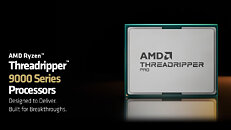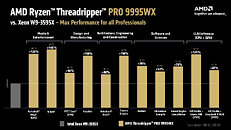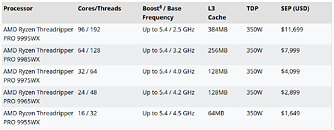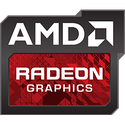
AMD Announces Official Ryzen Threadripper PRO 9000 WX-Series Pricing
A month ago, AMD launched the Ryzen Threadripper PRO 9000 WX-Series of processors, but at the time, the company didn't provide any pricing. Today, in a blog post, the company revealed the pricing for five of the six new Threadripper processors, skipping the 12-core 9945WX for some reason. As these are workstation chips with up to 96 cores, pricing is accordingly high, with the 16-core 9955WX coming in at US$1,649. The 24-core 9965WX comes in at US$2,899, followed by the 32-core 9975WX at US$4,099. Things start to get really eye watering with the 64-core 9985WX at US$7,999 and finally the 96-core 9995WX at US$11,699.
In all fairness, the per core cost actually gets a lot lower with the two high-end parts, but it's pretty clear that these 350 W TDP chips are not intended for consumer use. AMD also added some new benchmark figures, comparing the 9995WX with Intel's Xeon W9-3595X. AMD claims to best it by between 40 and 145 percent, depending on the benchmark in question. It's a bit of an unfair comparison though, as the W9-3595X is only a 60-core CPU that has an MSRP of US$5,889, but Intel doesn't have any higher-end options in its workstation lineup either. It would've made more sense to put the W9-3595X up against the 9985WX though, as the two are closer both in terms of core count and price point.
In all fairness, the per core cost actually gets a lot lower with the two high-end parts, but it's pretty clear that these 350 W TDP chips are not intended for consumer use. AMD also added some new benchmark figures, comparing the 9995WX with Intel's Xeon W9-3595X. AMD claims to best it by between 40 and 145 percent, depending on the benchmark in question. It's a bit of an unfair comparison though, as the W9-3595X is only a 60-core CPU that has an MSRP of US$5,889, but Intel doesn't have any higher-end options in its workstation lineup either. It would've made more sense to put the W9-3595X up against the 9985WX though, as the two are closer both in terms of core count and price point.






























































































